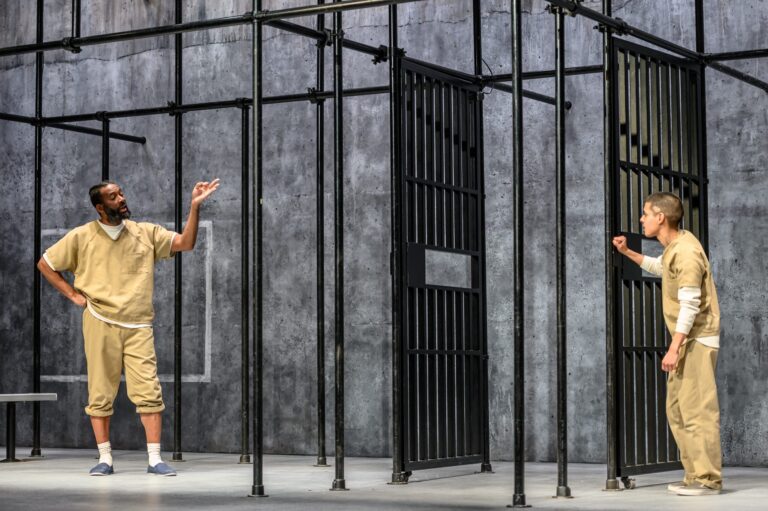REVIEW: Jesus Hopped the ‘A’ Train
Intermission is thrilled to be hosting the inaugural theatre reviews of the Emerging Arts Critics Programme 2019/20 season. Intermission is partnering with Soulpepper Theatre Company and theatre critic Robert Cushman to mentor this season’s participants.
“Our Father, who art in Heaven, Howard be thy name,” says the terrified young man, kneeling alone on a not-so-silent night. But wait, those aren’t the right words. Forgive him – Angel hasn’t done this in a while.
Jesus Hopped the ‘A’ Train by Stephen Adley Guirgis is the latest play helmed by Soulpepper’s artistic director, Weyni Mengesha. It’s a challenging piece of theatre, exploring whether the divine lurks in surprising places – in a subway car, a cell, or even a killer’s heart. Nearly twenty years after its first performance, the play holds up, mainly because it throws up questions that never get dull: Can you ever justify breaking the law? Should a brutal upbringing excuse violent crimes? Does God love murderers?
Thirty-year-old Angel Cruz (Xavier Lopez) has just been thrown in Riker’s Island prison, the notorious institution on New York City’s East River. He’s being held there because, as he tells us, he “shot a man in the ass” earlier that week. The victim? Reverend Kim, a Lexus-driving cult leader who’s sucked in Angel’s childhood friend, Joey. Much to his disappointment, Angel is assigned a female lawyer, the tenacious Mary Jane Hanrahan (Diana Donnelly), and kept on 23-hour-a-day lockdown. While taking fresh air in the prison yard, he meets Lucius Jenkins (Daren A. Herbert), a Jesus-praising child murderer facing extradition to Florida—and the death penalty.
Despite the characters’ violent crimes and looming sentences, the play is hilarious. The expletive-laden, New York-accented dialogue is punchy and raw. Herbert burns especially bright as eight-time killer Lucius, whose joy for God radiates beyond the prison’s cold iron bars. Sunbathing in the outdoor cage, he runs through aerobics routines better than Richard Simmons, all while singing praises of the Lord. His verbal faculty is virtuosic too, skipping through pep talks and parables with an ease that leaves the audience in stitches. I don’t quite believe he’s the tortured “manic-depressive, paranoid schizophrenic” he says he is – perhaps he needs to show us a few more streaks of crazy. Then again, maybe that’s the point: that Lucius is a changed man, a prodigal son. Some stomach-churning revelations about the nature of his crimes, and his childhood, however, make his conversion all the more incredible, and pose tough questions about the extent of divine forgiveness.

Xavier Lopez in Jesus Hopped the ‘A’ Train. Photo by Dahlia Katz.
Angel, meanwhile, is shy about God, skirting around questions of faith like a boxer dodging punches. Lopez’s slight physique and earnest delivery make him easy to love, especially when he reminisces about his lost friend Joey. He plays angry well too – raging against Revered Kim, Mary Jane, Lucius, God – as he grinds through the criminal justice system. He’s repulsed by Lucius’ crimes and sceptical of his beliefs. After exchanging a cigarette peace pipe, the two men eventually boil over into full-on brotherly war. Their frustration is staged well; they dart around their cells spewing arguments, unable to lunge at each other. Lucius is incensed by Angel’s spiritual doubts, saying, “Be blazin’ or freezin’, but doncha ever be cool!!!”
Interestingly, neither Lucius nor Angel deliver direct-to-audience monologues; these are left to the other three cast members, whose convictions are somewhat murkier. Though kitten-heeled lawyer Mary Jane at first appears to be a prim do-gooder, we learn in a cool aside that she has her own axe to grind. She also has far more in common with Angel than he might think. Tax-paying, law-abiding warden and former garbage collector Valdez (Tony Nappo), meanwhile, is convinced he doesn’t need God (despite his cruel taunting)—and yet, in a frank address to the audience, he laments our throwaway culture. Gregory Prest, seen last fall in Mengesha’s A Streetcar Named Desire, plays Charlie D’Amico, an affable security guard and friend of Lucius, who introduces an element of unconditional warmth to an otherwise prickly environment.
The prison itself could be grungier. At times, Ken Mackenzie’s set feels like a Yeezy lookbook; the inmates could be mistaken for models wearing trendy athleisure, posing in front of a minimalist backdrop. The bar-clanking sound effects are frightening enough, if perhaps underused, as is Angel’s post-beating makeup. Most perfect is the prison’s “outdoor” lighting (Kevin Lamotte) – you can almost feel the hot sun to which Lucius was, until recently, a stranger.
When you hit rock bottom, the big questions suddenly become clear, and the answers might come from unexpected places. Rollicking and heart rending, Soulpepper’s production makes you wonder whether absolution is truly open to all who ask for it. I think you’ll be surprised.
Jesus Hopped the ‘A’ Train runs through February 23 at the Young Centre for the Performing Arts, 50 Tank House Lane. For information and tickets click here.






Comments